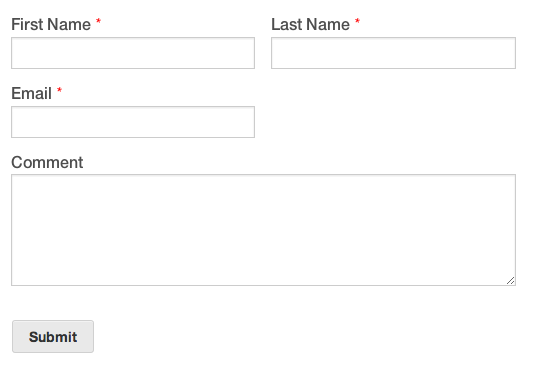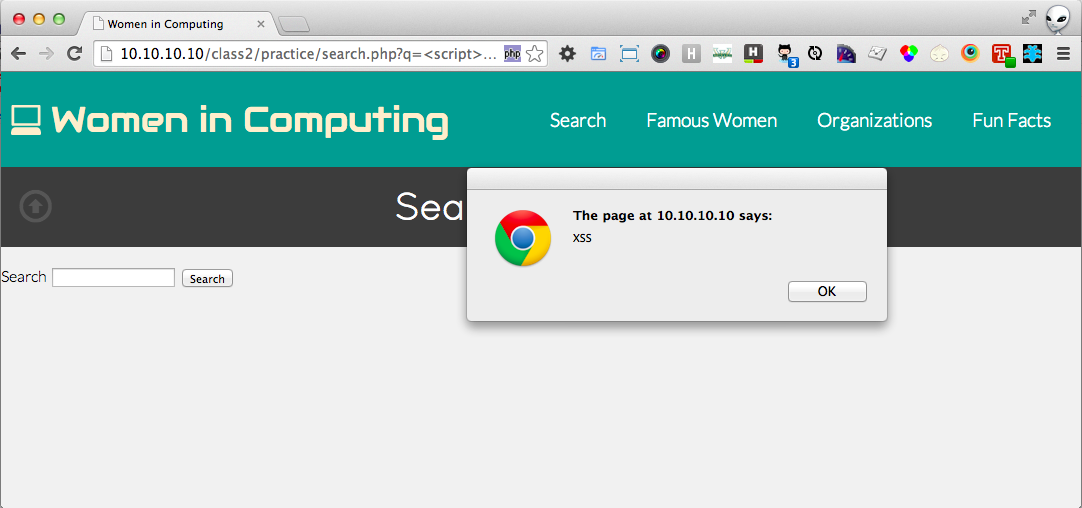Intro to PHP and MySQL
Class 2
Review
- <?php and .php files
- Printing to screen
- Variables
- Types
- Constants
- Arithmetic
- Conditionals
- Arrays
- Includes
- Loops
- Templating
Our creation
Looks exactly the same but less repeated code

Functions
Reusable pieces of code

Current code
index.php
<article class="woman">
<h3>
<a href="http://en.wikipedia.org/wiki/Ada_Lovelace">Ada Lovelace</a>
</h3>
<h4>(1815–1852)</h4>
<img src="images/ada_lovelace.jpg" alt="Ada Lovelace" />
<p>An analyst of Charles Babbage's analytical engine and is often
described as the "first computer programmer."</p>
</article>
<article class="woman">
<h3>
<a href="http://en.wikipedia.org/wiki/Grace_Hopper">Grace Hopper</a>
</h3>
<h4>(1906–1992)</h4>
<img src="images/grace_hopper.jpg" alt ="Grace Hopper" />
<p>A United States Navy officer and the first programmer of the
Harvard Mark I, known as the "Mother of COBOL". She developed the
first ever compiler for an electronic computer, known as A-0.</p>
</article>Turn the pattern into a function
index.php
<section id="famous">
<a name="famous"></a>
<h2>Famous Women</h2>
<a class="jump up" href="#">ì</a>
<a class="jump down" href="#organizations">í</a>
<div class = "wrapper">
<?php echo viewWoman('Ada Lovelace',
'http://en.wikipedia.org/wiki/Ada_Lovelace',
'(1815–1852)',
'images/ada_lovelace.jpg',
'An analyst of Charles Babbage\'s analytical engine and is often
described as the "first computer programmer."'); ?>
<?php echo viewWoman('Grace Hopper',
'http://en.wikipedia.org/wiki/Grace_Hopper',
'(1906–1992)',
'images/grace_hopper.jpg',
'A United States Navy officer and the first programmer of the
Harvard Mark I, known as the "Mother of COBOL". She developed the
first ever compiler for an electronic computer, known as A-0.'); ?>
</div>
</section>
Defining the function
functions.php
<?php
function viewWoman($name, $url, $years_lived, $image_url, $biography)
{
return '<article class="woman">
<h3><a href="' . $url . '">' . $name . '</a></h3>
<h4>' . $years_lived . '</h4>
<img src="' . $image_url . '" alt="' . $name . '" />
<p>' . $biography . '</p>
</article>';
}
Useful functions
explode
implode
trim
str_replace
htmlentities
filter_input
urlencode
htmlspecialchars
func_get_args
glob
...
Arguments
<?php
$class = 'Girl Develop It';
function WhereAmI($class){
return 'I am in the ' . $class . ' class.';
}
echo WhereAmI($class); // I am in the Girl Develop It class.
echo WhereAmI('Math'); // I am in the Math class.
echo WhereAmI(); // Error<?php
function WhereAmI($class, $location = 'Detroit'){
$using = 'a computer;
return 'I am in the ' . $class . ' class in ' . $location . ', using ' . $using . '.';
}
echo WhereAmI($class); // I am in the Girl Develop It class in Detroit, using a computer.
Variable scope
<?php
$global_variable = 'Some data';
function MyFunction($argument1, $argument2) {
$local_variable = $argument1 + $argument2;
return $local_variable;
}
Let's try it
There seems to be a lot of repeated code in the site.
Task:
Can you find this duplicate code and remove it?
Superglobals
$GLOBALS
$_SERVER
$_GET
$_POST
$_FILES
$_COOKIE
$_SESSION
$_REQUEST
$_ENV
Classes & Objects
Reusable and extendable representations of things.
Conceptually, a class represents an object, with associated methods and variables
Functions vs Classes
function:
function my_func($arg1,$arg2) {
<< function statements >>
return $value;
}
class:
<?php
class Dog {
public $name;
public function bark() {
echo 'Woof!';}
}
}
Using classes
<?php
require_once(‘dog.class.php’);
$puppy = new Dog();
$puppy->name = 'Rover';
echo "{$puppy->name} says ";
$puppy->bark();
Inheritance
<?php
class Poodle extends Dog {
public $type
public function set_type($height)
{
if ( $height < 10 )
{
$this->type = ‘Toy’;
}
elseif ( $height > 15 )
{
$this->type = ‘Standard’;
}
else
{
$this->type = ‘Miniature’;
}
}
}
Example
<?php
$puppy = new poodle(‘Oscar’);
$puppy->set_type(12); // 12 inches high!
echo “Poodle is called {$puppy->name}, ”;
echo “of type {$puppy->type}, saying “;
echo $puppy->bark();
…
Extending the example
<?php
class Dog {
...
public function bark() {
echo 'Woof!';}
}
}
<?php
class Poodle extends Dog {
...
public function bark() {
echo ‘Yip!’;
}
}
"Poodle is called Oscar, of type Standard, saying Yip!"
Deleting objects
Objects will not be deleted until the script has completed.
It is possible to delete the objects, like any other variable, using the 'unset()' function.
<?php unset($puppy);?>
Namespaces
<?php
// Some class included with a framework
class File {
...
}
<?php
// Your local file class
class File {
...
}
$myFile = new File; // Problem
Namespace
<?php
// Some class included with a framework
class File {
...
}
<?php
// Your local file class
namespace Acme;
class File {
...
}
$myFile = new Acme\File; // Your local File class
$theirFile = new \File; // The framework File class
Why use objects?
- Easier to maintain
Logical grouping of functions
- Extending code is easier
- Packaging functionality for re-use is possible
- Easier to maintain
Logical grouping of functions - Extending code is easier
- Packaging functionality for re-use is possible
Error Handling
<?php
// Turn off all error reporting
error_reporting(0);
// Report simple running errors
error_reporting(E_ERROR | E_WARNING | E_PARSE);
// Reporting E_NOTICE can be good too (to report uninitialized
// variables or catch variable name misspellings ...)
error_reporting(E_ERROR | E_WARNING | E_PARSE | E_NOTICE);
// Report all errors except E_NOTICE
error_reporting(E_ALL ^ E_NOTICE);
// Report ALL PHP errors
error_reporting(E_ALL);
?>
Hiding errors is NOT a solution to a problem.
Error suppression
<?php
/* Intentional file error */
$my_file = @file ('non_existent_file') or
die ("Failed opening file: error was '$php_errormsg'");
Halting the script is NOT a solution to a problem.
Exceptions
<?php
try {
if ( ($fp = @fopen($filename, "r")) == false)
{
throw new Exception;
}
do_file_stuff($fp);
} catch (Exception $e) {
handle_exception();
}
Exception class
<?php
Exception {
/* Properties */
protected string $message ;
protected int $code ;
protected string $file ;
protected int $line ;
/* Methods */
public __construct ([ string $message = "" [, int $code = 0 [, Exception $previous = NULL ]]] )
public string getMessage ( void )
public Exception getPrevious ( void )
public mixed getCode ( void )
public string getFile ( void )
public int getLine ( void )
public array getTrace ( void )
public string getTraceAsString ( void )
public string __toString ( void )
private void __clone ( void )
}
Forms

RESTful Resources

Form tag
<form method="get" action="search.php">
...
</form>Input tag
<input type="text" name="first_name">
<textarea name="comment" id="comment" cols="50" rows="4">
<input type="submit" name="submit" id="submit-button" value="Submit" />
Form flow
Form on page
↓
User input
↓
Clean
↓
Process
↓
Display results
Adding search
<?php
// Do search
if ( isset($_GET['q']) )
{
$results = DoSearch($_GET['q']);
}...
...
<form method="get" action="search.php">
<label for="q">Search</label>
<input type="input" name="q" id="q" value="" />
<input type="submit" value="Search" />
</form>
<section class="results">
<?php
echo '<p>Results for: ' . $_GET['q'] . '</p>';
foreach ( $results as $result )
{
ViewResult($result);
}
?>Avoiding XSS
What about the following search term?

filter_input()
<?php
$search_term = filter_input(INPUT_GET, 'q', FILTER_SANITIZE_SPECIAL_CHARS);
?>echo $_GET['q']
<script>alert('Xss');</script>echo $search_term
<script>alert('Xss');</script>Search an array
<?php
// If trying to search
if ( isset($_GET['q']) )
{
$search_term = filter_input(INPUT_GET, 'q', FILTER_SANITIZE_SPECIAL_CHARS);
if ( is_array($women) )
{
foreach ($women as $woman)
{
if ( stristr($women['name'], $search_term) )
{
$results[] = $women;
}
}
}
}
Display the results
<?php if ( isset($search_term) ) { ?>
<section class="results">
<p>Results for: <?php echo $search_term; ?></p>
<?php
foreach ($results as $woman)
{
echo viewWoman($woman['name'], $woman['link'], $woman['years'], $woman['image'], $woman['biography']);
}
?>
</section>
<?php } ?>
Validation
<?php
$clean = array();
if (ctype_alnum($_POST['username']))
{
$clean['username'] = $_POST['username'];
}
Reference: http://php.net/manual/en/book.ctype.php
ctype functions
-
ctype_alnum — Check for alphanumeric character(s)
-
ctype_alpha — Check for alphabetic character(s)
-
ctype_cntrl — Check for control character(s)
-
ctype_digit — Check for numeric character(s)
-
ctype_graph — Check for any printable character(s) except space
-
ctype_lower — Check for lowercase character(s)
-
ctype_print — Check for printable character(s)
-
ctype_punct — Check for any printable character which is not whitespace or an alphanumeric character
-
ctype_space — Check for whitespace character(s)
-
ctype_upper — Check for uppercase character(s)
-
ctype_xdigit — Check for character(s) representing a hexadecimal digit
Scenario:
Someone want to suggest a women in tech
Task:
Add a suggestion form to the website that
PHP & MySQL - Class 2 - Girl Develop It
By Nick DeNardis
PHP & MySQL - Class 2 - Girl Develop It
- 1,742




